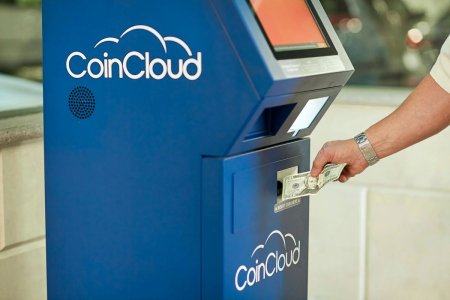She lost $17,500 to a bitcoin ATM scam—what happened and how to stay safe
By
Veronica E.
- Replies 0
It started like so many scams do: a quick text about a suspicious charge.
Stacy Hazinski just wanted to make sure her account wasn’t being billed for something she didn’t buy.
But by the time it was over, she had lost her entire tax refund and savings—$17,500 gone in a matter of hours.
Her story isn’t unique—and it’s exactly the kind of scam that’s growing in the US, particularly targeting older adults.
So how do these scams work, and what steps can we take to protect ourselves and our loved ones?

Hazinski, 51, lives in Michigan and had recently been laid off from her job.
She’d filed her taxes early and was counting on that refund to help cover expenses.
So when she got a message about a $114 charge on her Apple Pay account, she called the number listed.
On the other end was a man claiming to be from Apple—followed by another pretending to be from her credit union.
They said her money was in danger, being funneled into a gambling account she’d never heard of.
And they convinced her the only way to keep it safe was to take it out and move it into what they called a “security account.”
It all sounded urgent. She was scared. And so she followed their instructions.
First, they told her to go to her credit union and withdraw $12,500 in cash.
Then they had her take out $5,000 more.
When the teller asked why she needed the money, she repeated the story the scammers gave her—that it was for home improvements.
She had no such plans.
Next, they sent her to a party store—not to shop, but to use a bitcoin ATM located by the front register. They said it was a secure way to protect her money from being stolen.

They stayed on the phone the entire time, coaching her through every step.
When the machine asked for a QR code, they texted her one to scan.
She later found out that QR code sent her funds directly into the scammer’s crypto wallet.
“I was standing there at least a half hour putting money in that machine,” she said.
She didn’t understand the technology or how it worked. She was just trying to keep her money safe.
Cryptocurrency ATMs are unregulated in most places and offer little to no consumer protection.
Once you deposit cash and scan a wallet address, it’s nearly impossible to recover your money.
According to the Federal Trade Commission, Americans lost $66 million to crypto ATM fraud in the first half of 2024.
And those 60 and older are over three times as likely as younger adults to report being victims.
Scammers also call these machines “safety lockers” to make them sound secure, and they know exactly where these ATMs are located in your neighborhood—whether it’s a gas station, liquor store, or corner market.
Hazinski said she didn’t see any visible scam warnings on the machine, despite Bitcoin Depot stating they display them during the transaction.
No one in the store said a word as she deposited her life savings into the machine, one bill at a time.
It wasn’t until her teenage son called, worried she was late getting home, that the spell started to break.
When she explained what she was doing, he asked, “Mom, are you kidding me?” That moment of clarity was all it took for her to realize the truth.
But by then, it was too late.
Stories like Hazinski’s have become so widespread that lawmakers are starting to take action. In February, Senator Dick Durbin introduced the Crypto ATM Fraud Protection Act, which would:
Durbin called for “commonsense guardrails” in an industry that’s left too many consumers exposed.
Meanwhile, companies like Bitcoin Depot say they’re doing their part—posting scam alerts on machines and offering live support.
But victims like Hazinski say they never saw any warning, just a screen that said, “Crypto made easy.”
If something feels rushed or pressured, it’s a warning sign. No real company or agency will ask you to pay with bitcoin, gift cards, or wire transfers.
Here are a few safety tips to keep in mind:
Scams like this can happen to anyone.
Staying informed, asking questions, and talking to someone you trust can make all the difference.
Read next: Woman admits to $5M Department of Education fraud scheme involving “straw students”

At The GrayVine, we believe information is power. If you've ever been targeted by a scam, or if you've learned tips that could help someone else, we’d love to hear from you. Share your story in the comments—your experience might just prevent the next person from falling into the same trap.
Stacy Hazinski just wanted to make sure her account wasn’t being billed for something she didn’t buy.
But by the time it was over, she had lost her entire tax refund and savings—$17,500 gone in a matter of hours.
Her story isn’t unique—and it’s exactly the kind of scam that’s growing in the US, particularly targeting older adults.
So how do these scams work, and what steps can we take to protect ourselves and our loved ones?

What looks like a simple ATM transaction can sometimes be part of a scam—one that’s hard to undo once the money is gone. Image Source: Pexels / Moe Magners.
“You’re being scammed”—but she didn’t know it yet
Hazinski, 51, lives in Michigan and had recently been laid off from her job.
She’d filed her taxes early and was counting on that refund to help cover expenses.
So when she got a message about a $114 charge on her Apple Pay account, she called the number listed.
On the other end was a man claiming to be from Apple—followed by another pretending to be from her credit union.
They said her money was in danger, being funneled into a gambling account she’d never heard of.
And they convinced her the only way to keep it safe was to take it out and move it into what they called a “security account.”
It all sounded urgent. She was scared. And so she followed their instructions.
Also read: Discover the smart scam alert that could protect your bank account!
How scammers guide victims step-by-step
First, they told her to go to her credit union and withdraw $12,500 in cash.
Then they had her take out $5,000 more.
When the teller asked why she needed the money, she repeated the story the scammers gave her—that it was for home improvements.
She had no such plans.
Next, they sent her to a party store—not to shop, but to use a bitcoin ATM located by the front register. They said it was a secure way to protect her money from being stolen.

Bitcoin ATMs, like the one pictured here, have become a popular tool for scammers due to their lack of regulation and irreversible transactions. Image Source: Pexels / Elise.
They stayed on the phone the entire time, coaching her through every step.
When the machine asked for a QR code, they texted her one to scan.
She later found out that QR code sent her funds directly into the scammer’s crypto wallet.
“I was standing there at least a half hour putting money in that machine,” she said.
She didn’t understand the technology or how it worked. She was just trying to keep her money safe.
Also read: Think twice before sharing that viral post—it could be a scam.
Why bitcoin ATMs are a scammer’s dream tool
Cryptocurrency ATMs are unregulated in most places and offer little to no consumer protection.
Once you deposit cash and scan a wallet address, it’s nearly impossible to recover your money.
According to the Federal Trade Commission, Americans lost $66 million to crypto ATM fraud in the first half of 2024.
And those 60 and older are over three times as likely as younger adults to report being victims.
Scammers also call these machines “safety lockers” to make them sound secure, and they know exactly where these ATMs are located in your neighborhood—whether it’s a gas station, liquor store, or corner market.
Hazinski said she didn’t see any visible scam warnings on the machine, despite Bitcoin Depot stating they display them during the transaction.
No one in the store said a word as she deposited her life savings into the machine, one bill at a time.
It wasn’t until her teenage son called, worried she was late getting home, that the spell started to break.
When she explained what she was doing, he asked, “Mom, are you kidding me?” That moment of clarity was all it took for her to realize the truth.
But by then, it was too late.
Also read: Protect your inbox: How to spot and avoid USPS scam texts
The bigger picture—and the push for regulation
Stories like Hazinski’s have become so widespread that lawmakers are starting to take action. In February, Senator Dick Durbin introduced the Crypto ATM Fraud Protection Act, which would:
- Limit new customer transactions to $2,000/day and $10,000 over 14 days
- Require visible scam warnings
- Offer live verification for transactions over $500
- Require refunds if fraud is reported within 30 days
Durbin called for “commonsense guardrails” in an industry that’s left too many consumers exposed.
Meanwhile, companies like Bitcoin Depot say they’re doing their part—posting scam alerts on machines and offering live support.
But victims like Hazinski say they never saw any warning, just a screen that said, “Crypto made easy.”
Also read: BEWARE: This fraud scheme could put your Social Security at risk
What you can do to protect yourself
If something feels rushed or pressured, it’s a warning sign. No real company or agency will ask you to pay with bitcoin, gift cards, or wire transfers.
Here are a few safety tips to keep in mind:
- Hang up and verify — Don’t trust texts or calls from unknown numbers. Contact companies directly.
- Never use bitcoin ATMs to “secure” your money — No bank or government agency will ever ask this.
- Talk to someone you trust — A second opinion can save you thousands.
- Report scams — Visit reportfraud.ftc.gov to report suspicious activity.
Scams like this can happen to anyone.
Staying informed, asking questions, and talking to someone you trust can make all the difference.
Read next: Woman admits to $5M Department of Education fraud scheme involving “straw students”
Key Takeaways
- A Michigan woman lost $17,500 after scammers tricked her into depositing cash into a bitcoin ATM, believing it was a secure way to protect her savings.
- The scammers impersonated representatives from Apple and her credit union, using fear tactics and step-by-step instructions over the phone.
- The incident highlights growing concerns over crypto ATMs, which lack regulation and are difficult to trace once funds are transferred.
- Federal lawmakers are proposing legislation to curb fraud at these machines, including limits for new users and mandatory warnings.
- Bitcoin Depot, the ATM company involved, says it posts warnings and offers live support, but the victim stated she never saw any alerts during her transaction.
At The GrayVine, we believe information is power. If you've ever been targeted by a scam, or if you've learned tips that could help someone else, we’d love to hear from you. Share your story in the comments—your experience might just prevent the next person from falling into the same trap.






